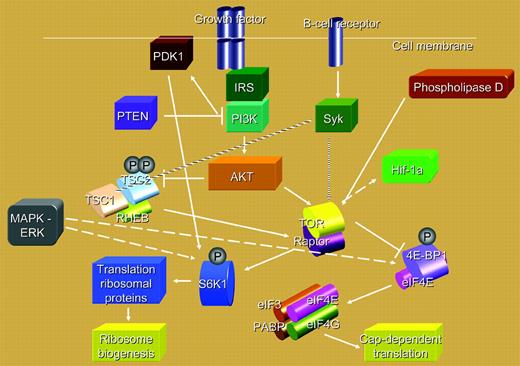Comment on Leseux et al, page 4156
Leseux and colleagues report that the Syk-dependent activation of the mTOR pathway is important to the survival of follicular lymphoma. They provide a strong rationale for a focus on Syk as a therapeutic target in B-cell lymphomas.
Dissection of the molecular pathways involved in initiating and propagating neoplastic processes is critical to the cure of cancer. Among these pathways, the phosphatidylinositol 3-kinase (PI3K)/AKT/mammalian target of rapamycin (mTOR) pathway is increasingly focused on as a potentially important therapeutic target in the hematologic malignancies.1 mTOR is a pivotal monitor of the cellular environment and a critical regulator of translation initiation through both the eukaryotic initiation factor 4E and ribosomal p70 S6 kinase pathways. Our knowledge on the mediation of key pathophysiologic activities of a variety of oncogenic kinases via the mTOR pathway is increasing rapidly. These data have focused attention on the development of therapeutic regimens based on either mTOR inhibition alone or such inhibition combined with inhibition of upstream targets such as vascular endothelial growth factor (VEGF), FMS-like tyrosine kinase 3 (FLT3), platelet-derived growth factor (PDGF), Raf, or break point-cluster region/Abelson leukemia (BCR-ABL).2 Recently, Pim-2 kinase has emerged as a potential mediator of resistance to mTOR inhibitor resistance in hematopoietic tissues, providing a rationale to pursue Pim kinase inhibitor as a potential enhancer of mTOR inhibitor activity.3
In the report by Leseux and colleagues in this issue of Blood, the authors focus on the role of the mTOR pathway in follicular lymphoma. The excess expression of Bcl-2, a potent antiapoptotic protein, is a major feature of follicular lymphoma and is a key factor in the resistance of this tumor to cytotoxic therapy.4 However the existence of alternate mechanisms of such resistance is suggested by clinical observations that outcomes in patients with Bcl-2–positive or –negative follicular lymphomas are not distinct. The search for alternate antiapoptotic pathways led to a focus on the mTOR pathway. As Syk is a protein tyrosine kinase important to intracellular signal transduction in B-cell neoplasms, the investigators focused on Syk deregulation as a possible mechanism of mTOR activation with a consequent conferring of a survival advantage on the neoplastic cells.FIG1
The authors demonstrated that in follicular lymphoma the mTOR pathway was indeed activated and that Syk is a critical up-regulator of this pathway by a mechanism that is independent of either the established PI3K/AKT or phospholipase D pathways of mTOR activation. The authors confirmed that specific inhibition of Syk using piceatannol or siRNA plasmids resulted in potent inhibition of mTOR activity in follicular, mantle cell, Burkitt, and diffuse large B-cell lymphoma cell lines.
These exciting data lead us to some important conclusions and raise some intriguing new questions. An important remaining question is how specifically Syk mediates its effects on mTOR. The authors suggest that Syk may act by modulation of TSC1/2, a proximal upstream regulator of mTOR (see figure). These data give a clear rationale to pursue existent mTOR inhibitors, including RAD001, CCI-779, and AP23573, possibly in combination with Bcl-2 inhibitors, in patients with follicular lymphoma.1 Many of our current kinase inhibitors have a much broader range of inhibitor activity than is initially focused on in the clinic.5 A screen of currently available kinase inhibitors for Syk inhibitor activity and the development of specific Pim and Syk inhibitors is indicated.
The author declares no competing financial interests. ▪


This feature is available to Subscribers Only
Sign In or Create an Account Close Modal